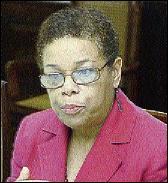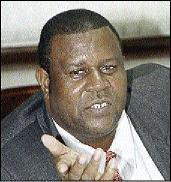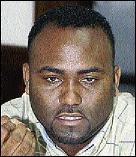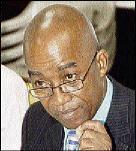
The island's mayors have demanded more support from central government to address the infrastructural and other deficiencies affecting parish councils.
Speaking at a Gleaner Editors' Forum at the newspaper's central Kingston offices recently, parish council chairpersons said the local authorities would achieve more if they were financially independent.
Here are excerpts from mayors Brenda Ramsay, Mandeville; Milton Brown, May Pen; Andrew Wheatley, Spanish Town; and Keith Hinds, Portmore, as well as Gleaner Editor-in-Chief Garfield Grandison.
RAMSAY:

Everybody here knows Manchester, so come with me to a parish that's like no other, and come with me to Mandeville in the centre of that town - a town of approximately 24,000 people impacted by three bauxite companies, a university, numerous secondary and high schools, vast returning residents. Come with me also to a town that has not grown with that population - infrastructure inadequate, dilapidated markets, no water or total inadequate water supply. This is what we are faced with in Manchester.
We also have the challenges of having farmers who have to compete with three bauxite companies that are mining within that one parish. So, here we are, having displaced people. What do we do as an alternative? These are some of the things we are grappling with in Manchester.
HINDS:

I am looking at more than 450,000 people, quite frankly, in (Portmore). The city is jumping out of its seams really in growth, in people growth, and what we are trying to do now is to look at how we can make an impact on the city in terms of development, in terms of getting people to be able to work in that city that they live in.
And hence the reason why we talk about the 15th parish ... so we can capture a little more land space, to bring in some business development in the city.
We are looking exactly at that right now in terms of the hospital project. We are sitting down and waiting on a Cabinet decision on the acquisition of land to move into that project ... (which) is perhaps over US$200 million (J$1.4 billion), which would change the face of that particular area.
I haven't discussed the case with Mayor Wheatley, but I would like to see with the composition of that project, an inner-city housing project for the Newland area, that would really develop along that line, and that would be something that we could look on at a later date. It's just something that came to mind and we will sit down and have some discussions with the councillor for that area, because it would really assist in the hospital project.
Then we talk about our own municipal building, because we are paying some almost half a million dollars a month in rental, and we have our own land space, and so we are looking at putting up a 300,000-square-foot building and already, we are getting serious demand for space. Now, even the people at pre-universities talking to us about space, COK talking to us about space, several persons, so we're really looking at developing the city and working along with that.
WHEATLEY:

I believe that over the years, St Catherine has been neglected, Spanish Town in particular has been neglected and we are currently seeing the negative effects of that. We talk about social problems affecting Spanish Town.
It's very difficult now to really make any positive change as it relates to policy that is different from what has become the norm. What you find in Spanish Town is that persons believe that doing the wrong thing is now the right way of doing things, so it poses a serious challenge for us.
Spanish Town has a very rich cultural heritage. Redevelopment of Spanish Town is number one on the agenda. Not only at the local government level, but also at central government level, because in order for us to revive Spanish Town to its former glory, we need cooperation from everyone, and in order to redevelop the town. The rich cultural heritage in Spanish Town is not being capitalised on and we at the parish council along with other stakeholders are moving full speed ahead to really push that engine of bringing back the rich cultural heritage.
I think people in Spanish Town do not appreciate what they have. It will take some effort on our part at least to educate the public to what we have in Spanish Town, the gold mine that is in Spanish Town, and it is at an ideal time now, because the Europeans coming in and being a major part of our tourists coming to the island, and those persons you find are more inclined to cultural and heritage tourism. It provides an ideal market for us.
The St Catherine Parish Council has instituted a number of programmes, regulating traffic flow throughout the town of Spanish Town. Today should be our first day for the implementation of our new permit-parking system.
WHEATLEY:
Something similar to what is in Mandeville and in Montego Bay. Again they are trying to improve on the situation in Mandeville, learn from their experience and also from the experience of Montego Bay.
We have the same problem as most other jurisdictions as it relates to infrastructure. Spanish Town is an old city, the streets are narrow, the markets are old and outdated. Right now, it's very difficult for us to do proper enforcement as it relates to vending, but we are in the process of trying to source funds, and at the same time addressing the basic needs of the market by trying to do minor repairs. The market, the cemetery, we have outgrown the current infrastructure, so that is also a challenge for us.
BROWN:

May Pen has been in the news daily for reasons we would rather not say. Probably our most challenging situation there now is crime and violence. It is impacting on the livelihood of investment in our community, and we recognise that we need to have a significant shift before we can encourage possible investors to come to May Pen the way we want them to.
Clarendon has open lands, whole lots of it, and thousands of acres, so we have that as an asset and we are really 45 minutes away from the Corporate Area. That, too, is an asset, and we have that to use. May Pen is an old town and we have a difficulty managing traffic in the town.
We are getting some roadwork done now, and that's been after many years of neglect. Like Spanish Town, nothing seems to have happened in May Pen over an extended period as far as repairs to our major roads, so we are seeing some changes. We think that that change will enable us to implement our traffic management plan that we have already sold to the community, and to the traffic authorities.
Vending on the streets is a perennial problem. We are in a position now where we had some damage from hurricanes Ivan and Dean that has put us in a position where at this point in time, I would like to go out there and tell all the vendors to leave the street, but I can't do that right now because of the facilities inside the market ... . Recently, the council committed $3 million to start the repairs in the market. We need $8 million to do a satisfactory level of repairs.
GRANDISON:
Where are you going to get the rest of money from?
BROWN:
It is our intention to ask the central government from the Equalisation Fund, and the fact that we have found $3 million for ourselves should make them understand we're really serious about the project and we think we should get some support from them. So we need to do major rehabilitation to our market.
What has happened, because of the fact that the market is in a bad way, the holding areas that we have provided, the motor-vehicle parks that we have provided, have been taken over by vendors, and that we need to correct. If we get the market situation corrected, I think that it will strengthen our position to enforce the removal of those persons from the parking areas.
We have a problem in Clarendon. While I am mayor of May Pen, I am chairman of Clarendon Parish Council ... . When it rains heavily on the plains, it is flooded out, but when it rains heavily in the hills, we have land slippage, and we get very little attention. Right now we have a list of about 48 projects that we need to tackle in the hills, where you have land slippages, bridges under stress that we need to tackle. So that's a major challenge we have, and we are putting together a proposal.
We are hoping that the EU (European Commission) will be able to help us, because they have taken a decision recently, and the Inter-American Development Bank is prepared to lend money directly to local authorities, provided we have the asset and we can substantiate that we can repay. So that is one area we will be exploring in the near future.
Probably one of the major problems we have in the parish is we don't have a comprehensive parish-development plan and from time to time, we are asked to make decisions, significant decisions, without the information that should enable us to make really informed decisions. Somebody applies to put up a factory in Salt River to transport, mine lime in the hills and export it abroad, and the fact that we did not have a comprehensive plan, we have to be making decisions on that project by itself without reference to how it would affect other potential projects. That's a thing we need in the parish; we need the overall parish-development plan.
We have something working with, because five, six years ago, the IADB, along with the stakeholder, the Jamaican Government, did a south- coast development plan that's available. Fantastic, but nothing has really been happening as far as implementation is concerned.
GRANDISON:
I want us to have a little discussion on our towns because I get the feeling that we are not proud of our towns. For example, 20 years ago when I used to cover Spanish Town, we had been talking about revitalising the town and doing all kinds of fancy things, but nothing has happened in 20 years. I mean, can't we as mayors ... decide that we are going to start with our towns and make the country, the people of the various parish proud of their towns and move from there? To me, you have to identify some successes and build around those.
HINDS:
You should see a difference in the town as long as we get the support that we need from the central government.
In Portmore, I can tell you, the former mayor and even myself used to quarrel, I used to hear him all the time saying he has never got a cent of capital injection in Portmore. He had to go about trying to find ingenious ways to put together office spaces, to buy computers and so on.
I have one fire truck in Portmore, that's a 1969 fire truck, and one fire station. Now, in certain other countries in the world, in Canada, for sure, residents would be suing me as the mayor for such. So, it is important that we as mayors understand our role and be forceful about how we go about doing our jobs.
WHEATLEY:
I just want to add, while I sympathise with Keith, we have to look at the realty of the situation where our local authorities have not developed that level of independence, and again we don't have the resources at our disposal to do most of these things. It is not only the elected representatives that must push this thing forward. A number of times you find local authorities coming, putting a particular project on stream, asking for the cooperation of the citizens in these communities, stakeholders.
It is very difficult. And I give a typical example, this new permit-parking system. We have had two public meetings, two weeks apart, and each time we printed at least 10,000 copies. We used even The Gleaner to advertise and we used other media to get the information out there, and the level of support, especially for the first meeting, you could count 20 persons in the audience, and we had around 600 chairs. I just tell you now, the citizens themselves need to buy in and participate.

